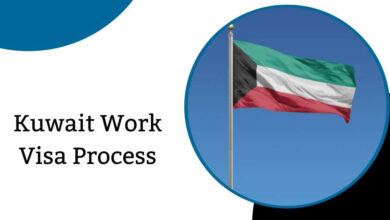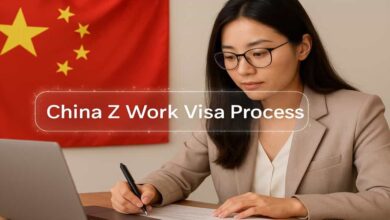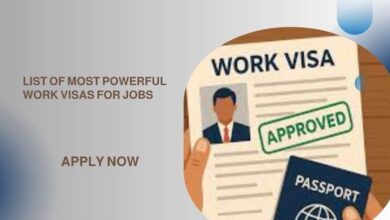South Korean Work Visa for Job Seekers 2026

Are you planning to start your job in South Korea? People looking for work can apply for a South Korean work visa, which can lead to a lot of different jobs with good pay based on their skill and field. If you want to work in an office, as a teacher, or doing hard work, most jobs are on-site.
This means you can fully experience Korea’s fast-paced work culture. Some jobs require experience, but a lot of them are open to dedicated newcomers who are ready to learn and grow. With the right visa, you can look for full-time work, gain useful international experience, and enjoy South Korea’s lively culture and way of life.
Top Types of South Korean Work Visa for Job Seekers:
H-1 Working Holiday Visa South Korea:
The work holiday visa H-1 Young adults (usually between the ages of 18 and 30) can live, work, and vacation in South Korea for up to one year. This visa is great for people who want to work abroad, learn about Korean culture, and get casual work to help pay for their trips. Those who want to apply must meet certain standards, such as having proof of funds and either a return ticket or enough money to buy one.
E-9 Non-professional Employment Work Visa South Korea:
Foreigners who work in non-professional jobs in South Korea can get an E-9 Non-professional Employment Work Visa. These jobs include farming, manufacturing, and building. This visa lets people legally live and work in South Korea as long as they have an employer there. Candidates must pass a test of their skills and be healthy enough and old enough. This visa makes it possible to get long-term work in South Korea’s labor-intensive industries.
E-2 English Teaching Work Visa South Korea:
The E-2 English Teaching Work Visa South Korea lets professionals who know English teach English in schools, academies, or universities. Those who want to apply must have a bachelor’s degree and no criminal record. The monthly pay is between ₩1.8 million and ₩2.5 million, and perks often include housing, airfare, and health insurance. When people want to teach abroad, this visa is often their first choice.
D-10 Job Seeker Visa South Korea:
The D-10 Visa for Job Seekers People from other countries can stay in South Korea for up to six months while they look for work. This visa is great for recent college graduates or skilled workers who want to look for work before they find a long-term job. Those who want to apply must show that they have the right schooling or experience and have enough money to live on while they look for work.
Why South Korea Needs You?
South Korea has trouble finding workers because its population is getting older and there aren’t many babies being born. Because of these things, there are big shortages in areas like science, agriculture, and manufacturing. To fill these gaps, the government has raised the number of visas available and is actively encouraging education in areas that are in high demand to bring in talented people from other countries.
Benefits of South Korean Work Visa for Job Seekers:
- Access to Diverse Job Opportunities: South Korea’s robust economy and diverse industries, including technology, engineering, education, and healthcare, offer a wide range of job opportunities for foreign laborers.
- Competitive salaries: Numerous positions provide salaries that are competitive with those of comparable positions in other countries, which is a financial incentive for expatriates.
- Skill Development: Employment in South Korea can improve professional abilities and offer exposure to a technologically advanced, fast-paced environment, particularly in disciplines such as engineering and information technology.
- Cultural Immersion: Job candidates can acquire a distinctive perspective on societal norms and business practices by living and working in South Korea, where they can become acquainted with the rich culture and acquire language skills.
- Networking Opportunities: Employment in South Korea can facilitate the development of a professional network both domestically and internationally, which can lead to future career advancements.
- Permanent Residency Pathway: Job candidates have the opportunity to establish permanent residence in South Korea by pursuing specific work visas that can lead to permanent residency.
- Family Benefits: Numerous work visas permit employees to bring their family members to South Korea, thereby enabling their spouses and children to reside and pursue education in the country.
- High Quality of Life: South Korea is renowned for its exceptional healthcare system, efficient public services, and high quality of life, which render it an appealing destination for both employment and residence.
- Social Security Benefits: Foreign laborers are eligible to receive benefits such as health insurance and pensions by contributing to the national social security system.
- Professional Development Programs: Numerous organizations in South Korea allocate resources to employee training and development, which offers prospects for professional advancement and skill development.
- Exposure to Advanced Technology: South Korea is a global leader in technology and innovation, providing job seekers with the opportunity to work with cutting-edge technology and practices.
- Support for Foreign Workers: The South Korean government and a variety of organizations offer resources and support services to foreign workers, assisting them in adjusting to life in the country and navigating the job market.
Hot Jobs and Degrees in South Korea:
South Korea needs skilled workers in a lot of different areas because its economy is growing and its businesses are driven by innovation. Here are the degrees, jobs, and skills that people want, along with the average salaries for each:
In-demand degrees in South Korea are:
Medical and Healthcare:
- Specializations: Medicine, Nursing, Pharmacology
- Average Salary: 60-90 million KRW ($45,000 – $67,500) annually
- Key Roles: Doctors, Nurses, Pharmacists
STEM Fields (Science, Technology, Engineering, Mathematics)
- Specializations: Computer Science, Data Science, Robotics, AI, Cybersecurity
- Average Salary: 70-100 million KRW ($52,500 – $75,000) annually
- Key Roles: Software Developers, Data Scientists, AI Specialists, Cybersecurity Experts
Engineering:
- Specializations: Electrical, Mechanical, Civil, Software Engineering
- Average Salary: 60-90 million KRW ($45,000 – $67,500) annually
- Key Roles: Electrical Engineers, Mechanical Engineers, Civil Engineers, Software Engineers
High-Demand Professions in South Korea:
IT Professionals:
- Roles: Software Developers, Data Analysts, Cybersecurity Experts
- Average Salary: 50-80 million KRW ($37,500 – $60,000) annually
Healthcare Professionals:
- Roles: Doctors, Nurses, Pharmacists
- Average Salary: 60-90 million KRW ($45,000 – $67,500) annually
Engineers:
- Specializations: Software, Electrical, Mechanical, Civil
- Average Salary: 60-90 million KRW ($45,000 – $67,500) annually
High-Tech Manufacturing Specialists:
- Roles: Semiconductor Engineers, Robotics Technicians, Process Engineers
- Average Salary: 70-100 million KRW ($52,500 – $75,000) annually
Skill Shortage Trades in South Korea:
Manufacturing Trades:
- Roles: Machine Operators, Welders, Assembly Technicians
- Average Salary: 30-50 million KRW ($22,500 – $37,500) annually
Construction Trades:
- Roles: Carpenters, Electricians, Plumbers, Welders
- Average Salary: 40-60 million KRW ($30,000 – $45,000) annually
Agriculture:
- Roles: Farm Managers, Agricultural Technicians
- Average Salary: 30-50 million KRW ($22,500 – $37,500) annually
Navigating South Korean Work Visas Types Available:
South Korea offers several work visas to attract skilled foreign workers. Here’s an overview of the main types and their eligibility requirements:
E-7 Visa (Specific Activities)
Subcategories:
- E-7-1: For professionals with a bachelor’s degree or higher in fields such as engineering, medicine, law, and education.
- E-7-2: For individuals with exceptional abilities in arts, sports, or other specialized fields.
- E-7-3: For investors or entrepreneurs contributing to the South Korean economy.
- E-7-4: For skilled workers who have legally worked in South Korea for at least four years on specific types of visas (E-9, E-10, or H-2).
Eligibility
- Job Offer: An official job offer from a South Korean company.
- Qualifications: The right kind of education and job experience.
- Clear Criminal Record: You must show proof of not having a criminal record.
- Health Check: You have to get a medical check.
D-8 Visa (Corporate Investment)
Eligibility:
- Investment: Putting at least USD 70,000 into a South Korean business.
- Active Participation: You must take an active role in running the business.
- Relevant Field: The business must be in an area that matters because of the lack of skills.
D-9 Visa (Trade Management)
Eligibility: Trade Managers: For managers of foreign trade who work for a Korean trading company or who want to start their own trading company in South Korea.
F-2 Visa (Residence)
Subcategory: F-2-7: Points-based system for skilled workers.
Eligibility: Points System: You get points based on your age, schooling, work experience, and how well you speak Korean. To qualify, you need to get a certain number of points.
F-4 Visa (Overseas Koreans)
Eligibility: Ethnic Koreans: For ethnic Koreans (including those with foreign nationality) who can show Korean language proficiency or have specific skills.
Read Also: South Korea Digital Nomad Visa – A Guide
Essential Requirements:
- Job Offer: A job offer from a South Korean employer is typically required.
- Qualifications: Must meet the exact requirements for education and work experience for the type of visa.
- Criminal Background Check: Must provide a clean criminal record.
- Health Check: Must pass a medical examination.
- Language Proficiency: It may be necessary to be able to speak Korean for some types of visas, but it’s not always necessary.
Finding Your Dream Job in South Korea on Job Seeker VISA:
South Korea’s economy needs people with skills like yours, whether you are an engineer, or work in healthcare, IT, or trades. Start your job search here:
List of New South Korean Government Job Portals
- WorkNet (워크넷): This is the main job site of the Korean Ministry of Employment and Labor. It has many job openings.
- Seoul Global Center: Provides a wide range of services to foreigners living in Seoul, such as job listings and business guidance.
- Saramin (사람인): Another big job site with lots of job openings for people in the United States and other countries.
Conclusion:
South Korea has a lot of job possibilities for skilled workers in trades, technology, healthcare, and engineering. The country has a growing economy and is working to bring in talented people from other countries. It also offers competitive salaries and a chance to learn about its rich cultural history. Check out the different types of work visas, make sure you meet the requirements, and then use job portals and other tools to start your search for a rewarding job in South Korea.
Frequently Asked Questions:
Is it simple to get a Korean work visa?
Getting a visa in Korea is quite challenging, and getting your hands on a working visa is impossible without a company willing to sponsor you. Sponsoring costs money, so only conglomerate companies (Samsung, SK, Hyundai, etc.) are often willing to hire foreigners.
What qualifications do I need to work in Korea?
For anyone who wants to work in South Korea, you need a university degree in the same field, as well as some level of Korean proficiency. You need a degree to teach, but it doesn’t have to be in education or teaching. The classroom does not require knowledge of Korean.
Can I go to Korea for a job?
Yes. After the CEPA was introduced between India and South Korea, Indians could work in 163 professions in South Korea.




